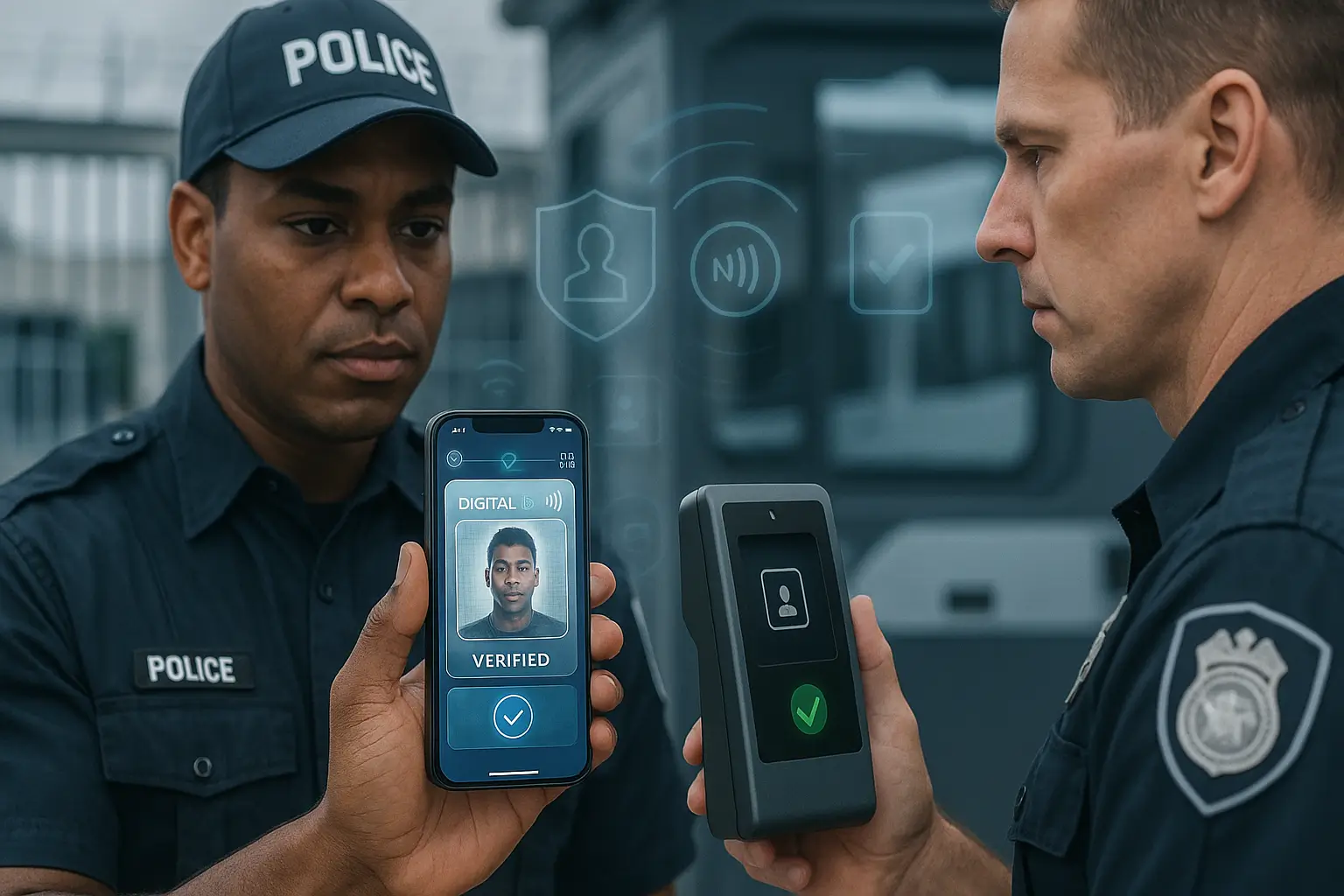In 2024 alone, multiple law enforcement agencies across the globe faced serious digital identity proofing failures incidents where unauthorized individuals gained access to restricted police systems using outdated or misused credentials. These breaches weren’t the result of high-level cyberattacks; they happened because the system still relied on plastic ID cards, usernames, and human trust.
For law enforcement, identity is power. It’s how an officer enters a secure crime scene, accesses a case file, or testifies in court. And yet, many departments still lack a reliable method to digitally verify an officer’s identity in real-time.
Digital identity proofing solves this problem. Using verifiable credentials, police departments can issue secure, tamper-proof digital IDs that live in a mobile wallet. These credentials can prove someone’s role, status, and clearance without revealing unnecessary personal data like an officer’s SSN or home address.
More importantly, these credentials can be revoked instantly, verified without calling HQ, and used across departments even across jurisdictions. For law enforcement leaders seeking to modernize operations without compromising trust or chain of command, this is not just a tech upgrade. It’s a foundational shift in how identity works in policing.
What Identity Challenges Do Police Officers Face Today?
Most law enforcement agencies still rely on physical ID cards, personnel databases, and internal memos to verify who’s who. These systems, though familiar, are deeply vulnerable. Cards can be lost or stolen. Internal systems can be bypassed or spoofed. And in high-pressure field situations, there’s often no easy way to confirm whether someone is truly an active-duty officer.
This creates critical gaps in police digital verification especially during inter-agency coordination, protest management, or rapid response operations. Officers may be asked to verify their role or authority on the spot, but the tools to do so securely and instantly often don’t exist.
Manual police credential verification processes not only slow down operations but open the door to impersonation. A fake badge or outdated ID should never be enough to grant access to a crime scene, sensitive evidence, or internal systems.
As a result, more departments are recognizing the urgent need for secure identity verification for police solutions that go beyond the badge and enable real-time, tamper-proof confirmation of role, status, and authority. Without it, the chain of trust remains dangerously breakable.
What Are Verifiable Credentials and How Do They Work?
Verifiable credentials (VCs) are tamper-proof digital certificates that prove something about a person such as their role, identity, or qualifications without relying on paper documents or manual checks.
In policing, a verifiable credential might confirm that an individual is an active officer, holds firearms clearance, or belongs to a specific unit. These secure digital credentials are issued by a trusted authority like a police academy or HR department and stored in a secure mobile wallet on the officer’s device.
What makes this system secure is cryptography. Each credential is digitally signed by the issuer and can be independently verified by anyone using a verifiable credentials system. No need to call headquarters or log into a central database. The verification happens in real time and can even work offline using a cached signature.
Unlike traditional ID cards or login credentials, verifiable credentials cannot be faked, copied, or reused once revoked. They offer officers a verifiable digital identity that’s portable, privacy-respecting, and instantly verifiable on duty, in the field, or across jurisdictions.
This isn’t just a new format for old IDs. It’s a shift in how identity is managed, verified, and trusted.
How Do Verifiable Credentials Enable Digital Identity Proofing for Police?
In a modern law enforcement setting, digital identity proofing powered by verifiable credentials creates a secure and efficient identity lifecycle from onboarding to field operations.
Let’s start with recruitment. When a new officer is onboarded, the HR or training division can issue a set of digital credentials including their officer ID, badge number, training certifications, and role directly to their secure digital wallet. These credentials are cryptographically signed and instantly verifiable.
Now, when that officer reports for duty or requests access to internal systems, they no longer need to rely on passwords or physical IDs. Instead, they present a QR code or NFC tap from their wallet. The system performs real-time authentication for law enforcement, verifying the credentials’ origin, validity, and current status. If the officer’s status changes resigned, suspended, or reassigned those credentials can be instantly revoked.
In the field, an officer can present their police digital ID during protests, inter-agency checks, or checkpoints. The verifier, another officer or command unit scans the credential using a mobile app. The system checks the cryptographic signature and confirms identity without exposing sensitive information like address or personal numbers.
This approach transforms digital credentials authentication into a fast, privacy-preserving, and secure process backed by technology but built for trust on the ground.
Where Can Verifiable Credentials Improve Police Operations?
The strength of verifiable credentials lies in how flexibly they adapt to real-world policing needs. From hiring to high-stakes field operations, these credentials streamline trust and access at every level.
1. Onboarding & HR
New recruits often go through a manual, paperwork-heavy identity verification process. With identity proofing solutions for police, credentials like academy completion, background clearance, and firearms training can be issued digitally. This allows recruits to carry verified identity from day one, no delays, no forgeries.
2. Field Verification
Imagine a protest site or a jurisdictional border. Officers on duty must prove their role, sometimes to unfamiliar personnel. With police digital credential management, an officer can instantly present verifiable ID via QR code or secure mobile tap confirming their authority without disclosing personal information.
3. Access Control
Access to evidence databases, internal records, or surveillance systems requires strict identity controls. Traditional login credentials are easily shared or compromised. By integrating identity management software for police, departments can enforce cryptographically secure logins, tied to each officer’s verified digital ID.
4. Inter-agency Trust
When officers operate across departments or jurisdictions, mutual trust can break down. With decentralized identity management in policing, credentials issued by one agency can be verified by another in seconds, no paperwork or manual approvals.
In each scenario, verifiable credentials don’t just prove identity, they enable faster, safer, and more accountable policing.
What Are the Benefits of Digital Identity Verification for Law Enforcement?
Switching to digital identity verification for police isn’t just about keeping up with technology—it’s about improving security, speed, and accountability across the board.
The most immediate advantage is fraud prevention. Digital credentials are cryptographically signed, making them nearly impossible to forge or reuse. This means only authorized personnel can access sensitive areas, systems, or responsibilities reducing the risk of impersonation or insider threats.
Verification also becomes faster. Instead of relying on phone calls, manual lists, or login systems, officers can present a secure QR code or mobile wallet credential. The result is real-time police identity authentication whether at the precinct, in the field, or during inter-agency operations.
Auditability improves too. Every credential issued, verified, or revoked can be logged in a secure, traceable way. Commanders can track who accessed what, when, and why boosting transparency and operational accountability.
Finally, these systems respect privacy. Officers no longer need to share personal details like home addresses or full ID numbers. Digital identity security for law enforcement ensures that only the necessary information is disclosed, and only when it’s needed.
The shift to digital verification isn’t cosmetic, it’s foundational for secure, modern policing.
Which Best Practices Should Police Follow When Implementing Verifiable Credentials?
Adopting verifiable credentials for police requires more than just installing a new system, it demands careful planning, training, and integration.
First, choose solutions that are interoperable and standards-compliant. Open standards like W3C Verifiable Credentials ensure your system can work across departments, jurisdictions, and future upgrades.
Second, invest in training. Officers and staff should be comfortable using digital wallets to manage and present credentials. Without proper onboarding, even the best tools may go underutilized.
Third, build clear revocation and access control mechanisms. If an officer leaves the force or is reassigned, their credentials should be immediately invalidated across all systems. This is essential for maintaining police digital verification integrity.
Finally, don’t isolate the new system. Make sure it integrates with your existing HR, access, and case management platforms. Strong identity management in policing depends on unifying these layers into a seamless and secure workflow.
A well-implemented system isn’t just functional, it builds trust, reduces friction, and future-proofs your department.
How Can Your Police Department Get Started with Digital Identity Proofing?
In an era where trust, speed, and accountability are mission-critical, relying on outdated ID cards and manual checks is a risk law enforcement can no longer afford. Law enforcement identity proofing with secure digital credentials isn’t just more efficient, it’s more secure, auditable, and scalable for the demands of modern policing.
By implementing a verifiable credentials system, departments can instantly verify officer identities, reduce impersonation risks, and ensure role-based access across every unit and jurisdiction. Whether you’re onboarding new recruits or securing inter-agency operations, police credential verification powered by digital tools is the way forward.
EveryCRED offers a ready-to-deploy, customizable solution built specifically for law enforcement.
Ready to see how it works?
Book a demo with EveryCRED and let our team walk you through a real-time use case tailored to your department’s needs.
Fill out the inquiry form today to start building a more secure, verifiable future for your force.

 3rd July, 2025
3rd July, 2025 



